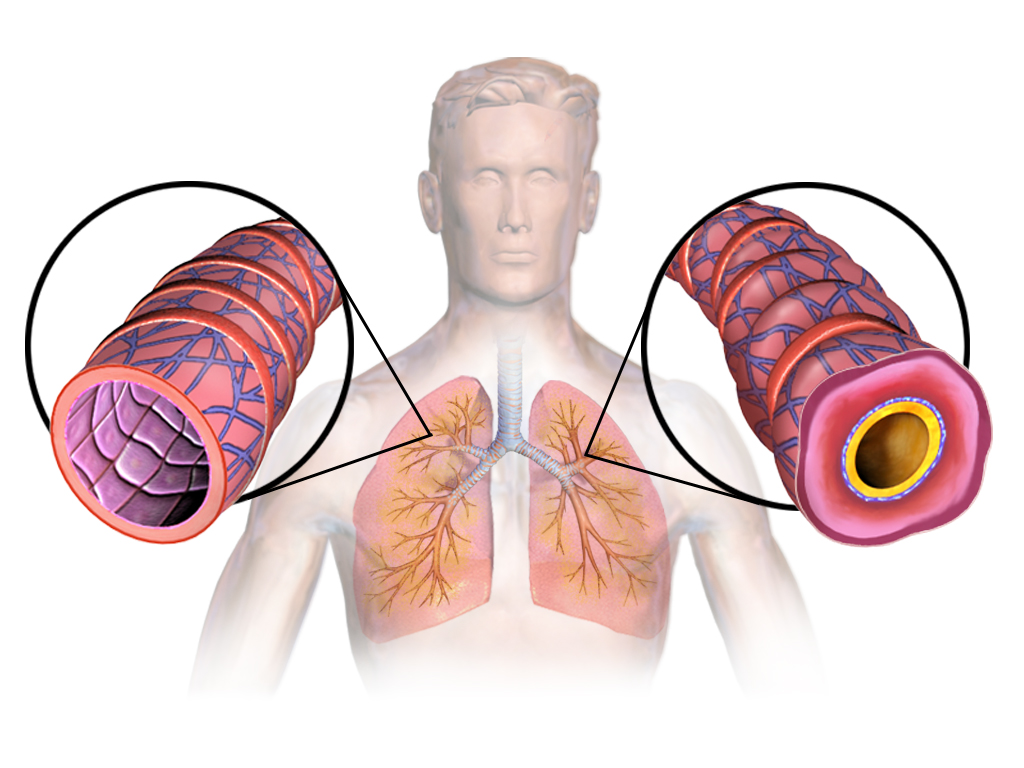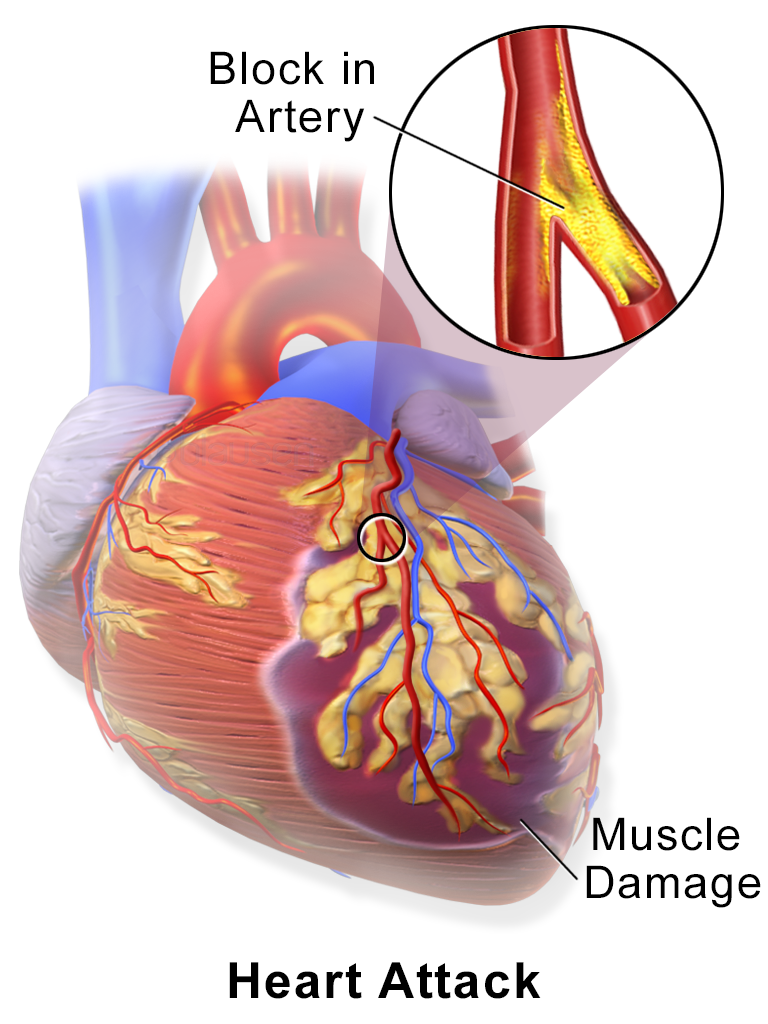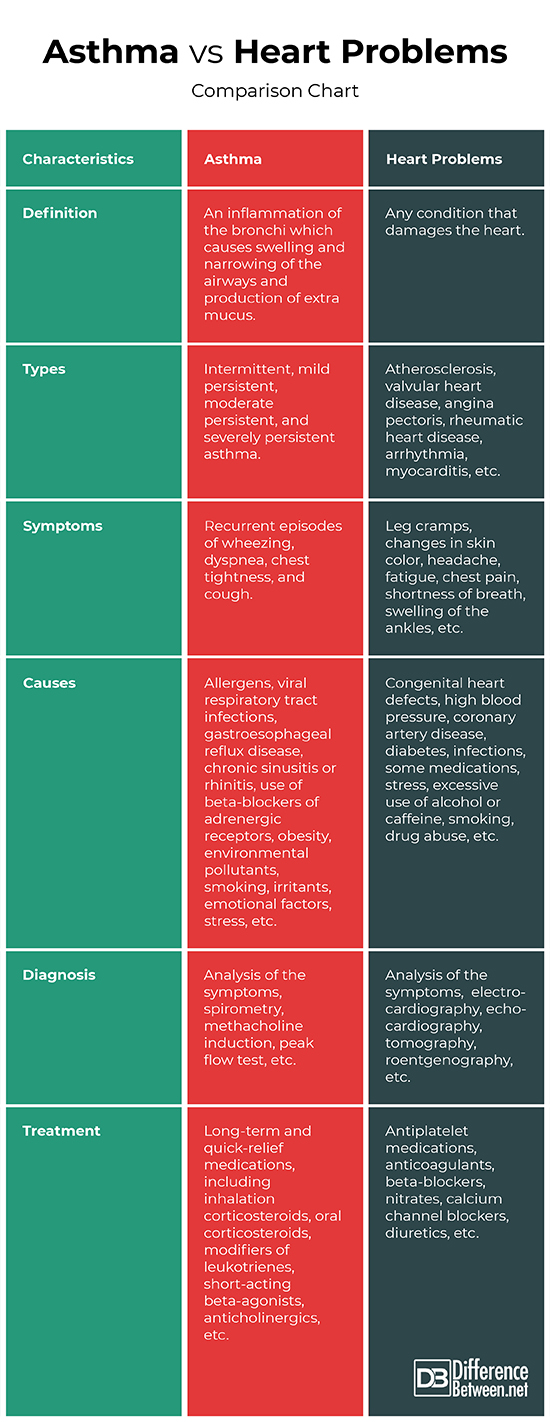Difference Between Asthma and Heart Problems
What is Asthma?
Asthma is an inflammation of the bronchi which causes swelling and narrowing of the airways and production of extra mucus. This triggers cough, shortness of breath, and wheezing. The breathing difficulties may range from mild to life-threatening.
Depending on the duration of the symptoms, asthma is:
- Intermittent – less than 2 weeks;
- Mild persistent –more than 2 weeks;
- Moderate persistent – daily;
- Severely persistent – permanent.
Asthma is characterized by recurrent episodes of wheezing, dyspnea, chest tightness, and cough. Symptoms usually get worse at night and early in the morning or as a result of physical exercise or cold air. Some patients with asthma experience symptoms rarely, usually in response to triggers, while others may have pronounced and persistent symptoms.
Asthma occurs due to a combination of complex and only partially known genetic factors and interactions with the environment. These factors influence the severity of the disease and its response to treatment.
Factors that may triiger asthma include:
- Allergens;
- Viral respiratory tract infections;
- Hyperventilation;
- Gastroesophageal reflux disease;
- Chronic sinusitis or rhinitis;
- Use of beta-blockers of adrenergic receptors;
- Obesity;
- Environmental pollutants, smoking;
- Irritants (household sprays, paint vapors, etc.);
- Emotional factors or stress;
- Perinatal factors.
Diagnosis of asthma is done through a detailed analysis of the symptoms and different studies, which may include:
- Spirometry;
- Methacholine induction;
- Peak flow test, etc.
The treatment of asthma is aimed at controlling symptoms rather than treating the condition. Asthma can be treated with long-term and quick-relief medications.
Long-term medications help reduce respiratory tract irritation and prevent asthma symptoms. These include:
- Inhalation corticosteroids;
- Oral corticosteroids.
- Combination of an inhalation corticosteroid and a long-acting beta agonist;
- Omalizumab (anti-IgE antibody);
- Modifiers of leukotrienes;
- Theophylline, etc.
Quick-relief medications are used for a rapid relieve of the symptoms. These include:
- Short-acting beta-agonists;
- Anticholinergics;
- A combination of an anticholinergic and a short-acting beta agonist.
What is Heart Problems?
Heart problem is any condition that damages the heart.
The heart problems include:
- Atherosclerosis;
- Valvular heart disease;
- Angina pectoris;
- Rheumatic heart disease;
- Arrhythmia;
- Myocarditis, etc.
The heart diseases develop slowly. That’s why the initial phases of heart problems have no symptoms or characteristic manifestations. Some first indications of a heart problem are leg cramps during walking, changes in skin color, headache, fatigue, chest pain, shortness of breath, swelling of the ankles.
Heart problems occur due to a variety of genetic and environmental factors, including:
- Congenital heart defects;
- High blood pressure;
- Coronary artery disease;
- Diabetes;
- Infections;
- Some medications;
- Stress;
- Excessive use of alcohol or caffeine;
- Smoking;
- Drug abuse, etc.
The heart problems are diagnosed through a detailed analysis of the symptoms and tests, which may include:
- Electrocardiography;
- Echocardiography;
- Tomography;
- Roentgenography, etc.
Different medications can be prescribed for a heart problem, including:
- Antiplatelet medications;
- Anticoagulants;
- Beta-blockers;
- Nitrates;
- Calcium channel blockers;
- Diuretics.
Difference Between Asthma and Heart Problems
-
Definition
Asthma: Asthma is an inflammation of the bronchi which causes swelling and narrowing of the airways and production of extra mucus.
Heart Problems: Heart problem is any condition that damages the heart.
-
Types
Asthma: Depending on the duration of the symptoms, asthma is intermittent, mild persistent, moderate persistent, and severely persistent.
Heart Problems: The heart problems include atherosclerosis, valvular heart disease, angina pectoris, rheumatic heart disease, arrhythmia, myocarditis, etc.
-
Symptoms
Asthma: The symptoms of asthma are recurrent episodes of wheezing, dyspnea, chest tightness, and cough.
Heart Problems: The symptoms of a heart problem are leg cramps during walking, changes in skin color, headache, fatigue, chest pain, shortness of breath, swelling of the ankles, etc.
-
Causes
Asthma: Asthma occurs due to a combination of genetic and environmental factors, including allergens, viral respiratory tract infections, gastroesophageal reflux disease, chronic sinusitis or rhinitis, use of beta-blockers of adrenergic receptors, obesity, environmental pollutants, smoking, irritants, emotional factors, stress, etc.
Heart Problems: Heart problems occur due to a variety of genetic and environmental factors, including congenital heart defects, high blood pressure, coronary artery disease, diabetes, infections, some medications, stress, excessive use of alcohol or caffeine, smoking, drug abuse, etc.
-
Diagnosis
Asthma: Diagnosis of asthma is done through a detailed analysis of the symptoms and a number of studies, which may include spirometry, methacholine induction, peak flow test, etc.
Heart Problems: The heart problems are diagnosed through a detailed analysis of the symptoms and a number of tests, which may include electrocardiography, echocardiography, tomography, roentgenography, etc.
-
Treatment
Asthma: Asthma can be treated with long-term and quick-relief medications, including inhalation corticosteroids, oral corticosteroids, modifiers of leukotrienes, short-acting beta-agonists, anticholinergics, etc.
Heart Problems: Heart problem can be treated with antiplatelet medications, anticoagulants, beta-blockers, nitrates, calcium channel blockers, diuretics, etc.
Asthma Vs. Heart Problems: Comparison Chart
Summary of Asthma Vs. Heart Problems:
- Asthma is an inflammation of the bronchi which causes swelling and narrowing of the airways and production of extra mucus.
- Heart problem is any condition that damages the heart.
- Asthma can be intermittent, mild persistent, moderate persistent, and severely persistent. The heart problems include atherosclerosis, valvular heart disease, angina pectoris, rheumatic heart disease, arrhythmia, myocarditis, etc.
- The symptoms of asthma are recurrent episodes of wheezing, dyspnea, chest tightness, and cough. The symptoms of a heart problem include leg cramps during walking, changes in skin color and temperature, headache, fatigue, chest pain, shortness of breath, swelling of the ankles, etc.
- Asthma can occur as a result of viral respiratory tract infections, gastroesophageal reflux disease, chronic sinusitis or rhinitis, use of beta-blockers of adrenergic receptors, obesity, environmental pollutants, smoking, irritants, emotional factors, stress, etc. Heart problems can occur as a result of congenital heart defects, high blood pressure, coronary artery disease, diabetes, infections, some medications, stress, excessive use of alcohol or caffeine, smoking, drug abuse, etc.
- Diagnosis of asthma and heart problems is done through a detailed analysis of the symptoms and a number of studies. The studies, used to detect asthma are spirometry, methacholine induction, peak flow test, etc. The tests used to diagnose heart problems are electrocardiography, echocardiography, tomography, roentgenography, etc.
- Asthma can be treated with long-term and quick-relief medications, including inhalation corticosteroids, oral corticosteroids, modifiers of leukotrienes, short-acting beta-agonists, anticholinergics, etc. Heart problems are treated with antiplatelet medications, anticoagulants, beta-blockers, nitrates, calcium channel blockers, diuretics, etc.
References:
Mann, D., D. Zipes, P. Libby, R. Bonow. Braunwald’s Heart Disease: A Textbook of Cardiovascular Medicine. 10th Edition. Philadelphia: Elsevier Saunders. 2014. Print.
Warrell, D., T. Cox, J. Firth. Oxford Textbook of Medicine, Vol. 2. Oxford: Oxford University Press. 2010. Print.
Yankova, Z. New Guide to Pulmonary Diseases and Tuberculosis. Sofia: Medical University Press. 2012. Print.
- Difference Between Gallstones and Cholecystitis - September 5, 2021
- Difference Between Constipation and Cramping - August 4, 2021
- Difference Between Whole Genome Sequencing and Microarray - May 6, 2021
Search DifferenceBetween.net :
Leave a Response
References :
[0]Image credit: https://commons.wikimedia.org/wiki/File:Blausen_0463_HeartAttack.png
[1]Image credit: https://commons.wikimedia.org/wiki/File:Asthma_(Lungs).png
[2]Mann, D., D. Zipes, P. Libby, R. Bonow. Braunwald's Heart Disease: A Textbook of Cardiovascular Medicine. 10th Edition. Philadelphia: Elsevier Saunders. 2014. Print.
[3]Warrell, D., T. Cox, J. Firth. Oxford Textbook of Medicine, Vol. 2. Oxford: Oxford University Press. 2010. Print.
[4]Yankova, Z. New Guide to Pulmonary Diseases and Tuberculosis. Sofia: Medical University Press. 2012. Print.



